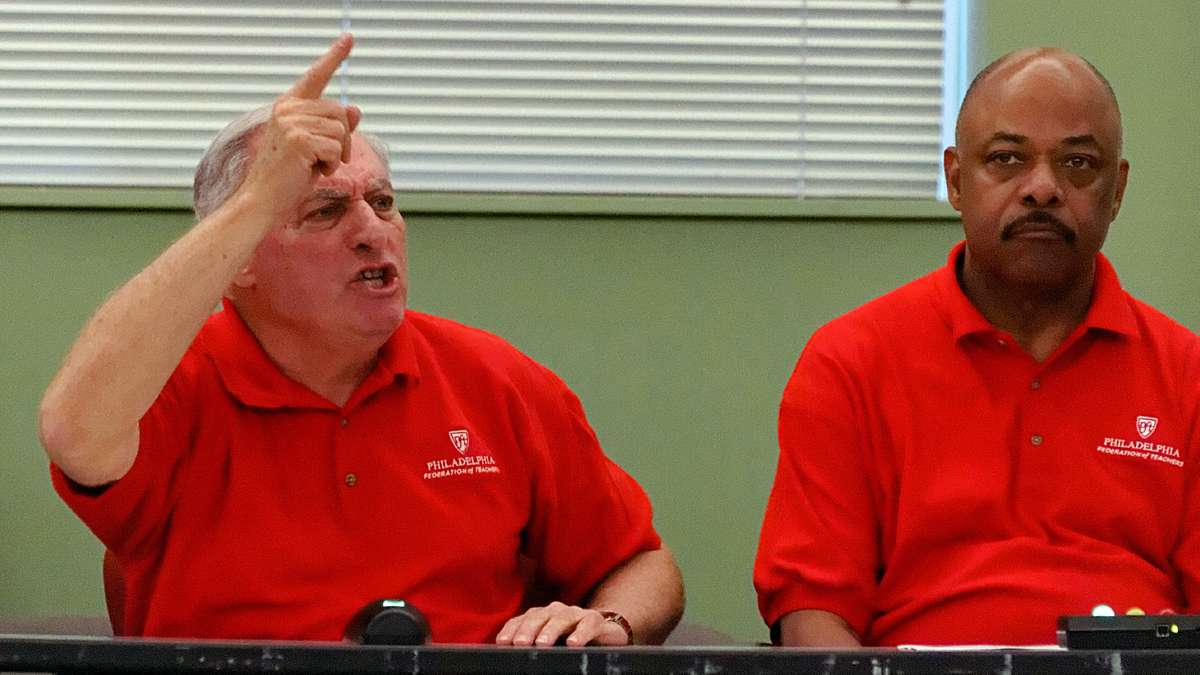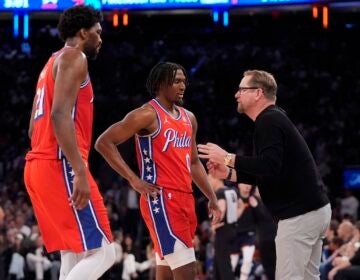Wannabe mayors make their pitches to Philadelphia teachers

(Bas Slabbers/for NewsWorks)
Tuesday night, it was the milliennials.
Wednesday afternoon, six of the Democrats vying to be Philadelphia’s next mayor pitched themselves to members of the city’s teachers union, hoping to score another endorsement — or in several cases, any endorsement at all.
The Philadelphia Federation of Teachers (PFT) uses the forum to help decide who gets its support and its maximum-allowable campaign contributions. Union president Jerry Jordan says members will vote starting next week and announce a formal endorsement by mid-March.
Each candidate was given five minutes to talk and ten minutes for questions from the audience, ranging from how they’d raise money for public schools to the role of standardized tests to their thoughts on resolving teacher contract negotiations that have dragged on for more than two years.
Since it was a private union meeting, members of the press were not allowed inside the auditorium at the Sheetmetal Workers Union Hall on Columbus Blvd. However, NinetyNine and WHYY education reporter Kevin McCorry caught up with the candidates as they walked out:
Lynne Abraham:
As a former district attorney, you KNOW Abraham had something to say about the case before the state Supreme Court over the fate of the teachers union contract. She hopes the justices uphold the Commonwealth Court’s ruling that the School Reform Commission cannot legally cancel its contract with the PFT and impose healthcare concessions.
“When that occurs, we can get back to the bargaining table, give these teachers what they need: the tools, the supplies, the counselors, the nurses and everything they need to make children’s education what they want it to be, which is the top priority in their lives,” she said. “They dedicate their lives to our children.”
Nelson Diaz:
His main idea for raising more local funds for schools is to increase real estate tax revenue by increasing the number of businesses in the city and keeping jobs from moving out to the suburbs.
“We need to entice more businesses to locate here so that we raise our revenues and when we raise our revenues, then we can reduce the wage taxes so that we essentially put the burden where it belongs,” Diaz said, insisting he would not increase taxes on individual businesses.
James Kenney:
Kenney enjoyed a clear edge over the other candidates with this audience, and according to his own account, his proposal for expanding the School Reform Commission to include a board for parents elicited cheers from the audience. He also reiterated his pledge to seek a student-weighted funding formula for Philadelphia.
“I’m not a charter opponent. I’m a public school proponent,” he said. “I think that we need to have fair subsidies for our charter schools in Philadelphia so that they don’t bleed out resources from the public schools.”
Doug Oliver:
So here’s a new one: Oliver says one the reason it’s so hard to get more funding from Harrisburg is that lawmakers outside Philadelphia don’t trust the district to spend its money wisely. So he’s proposing a forensic audit to gain their trust and eliminate potential waste — “not a city controller audit, not my own. In fact, I’d let them pick the auditor,” he said.
“I think there’s a lot of money tied up in the school district that doesn’t necessarily have to be and those are parts of the reasons why money doesn’t get to the classroom.”
Oliver says he would also be willing to privatize city assets, inlcuding Philadelphia Gas Works and the Parking Authority, to bring in more revenue.
Rev. Keith Goodman:
A newcomer to the race, Goodman says he wants to stop the expansion of charter schools.
“We’ve got to hold them more accountable for students and encourage their teachers to get certified just like the district and then hold the line so we don’t keep draining from that pot,” he said.
His plan for raising more local dollars? Speeding up the collection of unpaid property taxes and encouraging redevelopment of blighted, vacant buildings to bring in even more revenue.
Anthony Williams:
Williams arguably had the most to prove with this crowd, especially considering the large checks he’ll be receiving from pro-charter PACs. He says he wanted to set the record straight, highlighting the legislative work he’s done during his 30 plus years in Harrisburg to bring more funding to city schools.
“I wanted credit for my record for supporting public education funding. And I do,” he said. “I think that it gets marginalized because of the dynamics of politics and it gets marginalized because people don’t want to be able to reconcile that you can do two things at one time. You can support public education and aggressively support public education, while critiquing it.”
Reaction
Teachers filing out afterwards had a common name on the tips of their tongues: former city councilman James Kenney.
“I liked how James Kenney had a lot of solutions, that he was already talking about ideas, ways he could bring money back to the school district,” said Megan McGlynn, a sixth grade teacher at H.A. Brown elementary in Kensington.
WHYY is your source for fact-based, in-depth journalism and information. As a nonprofit organization, we rely on financial support from readers like you. Please give today.




